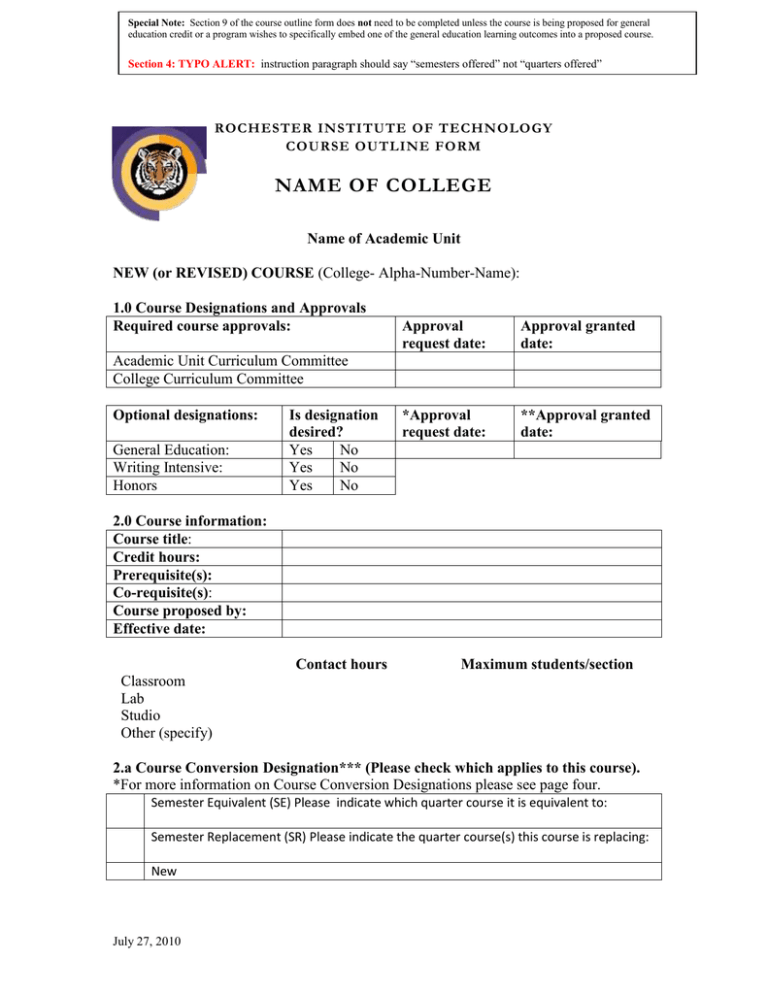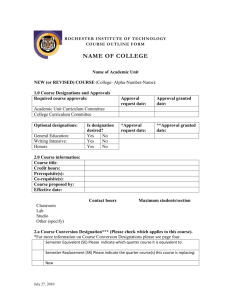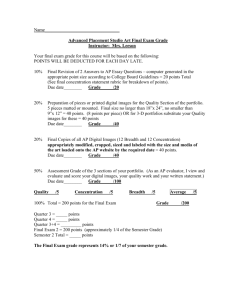RIT Course Outline form
advertisement

Special Note: Section 9 of the course outline form does not need to be completed unless the course is being proposed for general education credit or a program wishes to specifically embed one of the general education learning outcomes into a proposed course. Section 4: TYPO ALERT: instruction paragraph should say “semesters offered” not “quarters offered” ROCHESTER INSTITUTE OF TECHNOLOGY COURSE OUTLINE FORM NAME OF COLLEGE Name of Academic Unit NEW (or REVISED) COURSE (College- Alpha-Number-Name): 1.0 Course Designations and Approvals Required course approvals: Approval request date: Approval granted date: *Approval request date: **Approval granted date: Academic Unit Curriculum Committee College Curriculum Committee Optional designations: General Education: Writing Intensive: Honors Is designation desired? Yes No Yes No Yes No 2.0 Course information: Course title: Credit hours: Prerequisite(s): Co-requisite(s): Course proposed by: Effective date: Contact hours Maximum students/section Classroom Lab Studio Other (specify) 2.a Course Conversion Designation*** (Please check which applies to this course). *For more information on Course Conversion Designations please see page four. Semester Equivalent (SE) Please indicate which quarter course it is equivalent to: Semester Replacement (SR) Please indicate the quarter course(s) this course is replacing: New July 27, 2010 2.b Semester(s) offered (check) Fall Spring Summer Other All courses must be offered at least once every 2 years. If course will be offered on a biannual basis, please indicate here: 2.c Student Requirements Students required to take this course: (by program and year, as appropriate) Students who might elect to take the course: In the sections that follow, please use sub-numbering as appropriate (eg. 3.1, 3.2, etc.) 3.0 Goals of the course (including rationale for the course, when appropriate): 4.0 Course description (as it will appear in the RIT Catalog, including pre- and corequisites, and quarters offered). Please use the following format: Course number: Name of Course Description as you want it to appear in the catalog. (Pre or co-requisites) Class X, Lab X, Credit X (Semester offered) 5.0 Possible resources (texts, references, computer packages, etc.) 6.0 Topics (outline): 7.0 Intended course learning outcomes and associated assessment methods of those outcomes (please include as many Course Learning Outcomes as appropriate, one outcome and assessment method per row). Course Learning Outcome Assessment Method 8.0 Program outcomes and/or goals supported by this course 2 9.0 General Education Learning Outcome Supported by the Course, if appropriate Assessment Method Communication Express themselves effectively in common college-level written forms using standard American English Revise and improve written and visual content Express themselves effectively in presentations, either in spoken standard American English or sign language (American Sign Language or English-based Signing) Comprehend information accessed through reading and discussion Intellectual Inquiry Review, assess, and draw conclusions about hypotheses and theories Analyze arguments, in relation to their premises, assumptions, contexts, and conclusions Construct logical and reasonable arguments that include anticipation of counterarguments Use relevant evidence gathered through accepted scholarly methods and properly acknowledge sources of information Ethical, Social and Global Awareness Analyze similarities and differences in human experiences and consequent perspectives Examine connections among the world’s populations Identify contemporary ethical questions and relevant stakeholder positions Scientific, Mathematical and Technological Literacy Explain basic principles and concepts of one of the natural sciences Apply methods of scientific inquiry and problem solving to contemporary issues Comprehend and evaluate mathematical and statistical information Perform college-level mathematical operations on quantitative data Describe the potential and the limitations of technology Use appropriate technology to achieve desired outcomes Creativity, Innovation and Artistic Literacy Demonstrate creative/innovative approaches to course-based assignments or projects Interpret and evaluate artistic expression considering the cultural context in which it was created 10.0 Other relevant information (such as special classroom, studio, or lab needs, special scheduling, media requirements, etc.) 3 *Optional course designation; approval request date: This is the date that the college curriculum committee forwards this course to the appropriate optional course designation curriculum committee for review. The chair of the college curriculum committee is responsible to fill in this date. **Optional course designation; approval granted date: This is the date the optional course designation curriculum committee approves a course for the requested optional course designation. The chair of the appropriate optional course designation curriculum committee is responsible to fill in this date. ***Course Conversion Designations Please use the following definitions to complete table 2.a on page one. Semester Equivalent (SE) – Closely corresponds to an existing quarter course (e.g., a 4 quarter credit hour (qch) course which becomes a 3 semester credit hour (sch) course.) The semester course may develop material in greater depth or length. Semester Replacement (SR) – A semester course (or courses) taking the place of a previous quarter course(s) by rearranging or combining material from a previous quarter course(s) (e.g. a two semester sequence that replaces a three quarter sequence). New (N) - No corresponding quarter course(s). 4


